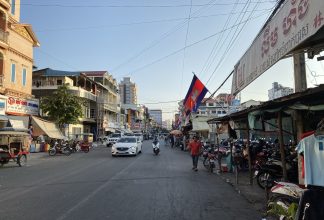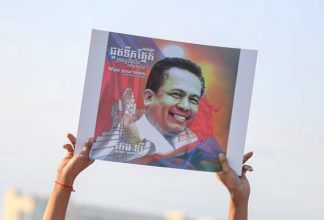Joint Open Letter Regarding the Investigation Into the Death of Dr. Kem Ley
 In a joint open letter, Civil Rights Defenders and XX other organisations demand the re-opening of the investigation into the death of Dr. Kem Ley, a prominent Cambodian activist and political analyst who was murdered on 10 July 2016.
In a joint open letter, Civil Rights Defenders and XX other organisations demand the re-opening of the investigation into the death of Dr. Kem Ley, a prominent Cambodian activist and political analyst who was murdered on 10 July 2016.
The letter was issued in light of fresh evidence which has emerged since the original investigation was officially closed on 23 December 2016.
Dear Head Prosecutor,
We, the undersigned civil society organisations (“CSOs”), are writing to demand the re-opening of the investigation into the death of Dr. Kem Ley, a prominent Cambodian activist and political analyst who was murdered on 10 July 2016, in light of fresh evidence which has emerged since the original investigation was officially closed on 23 December 2016. The trial of the only suspect, Mr. Oeuth Ang, is scheduled to begin on 1 March 2017. We further respectfully suggest that the President of the Phnom Penh Municipal Court consider postponing this trial until such time as a full, thorough, transparent, independent and impartial investigation has been conducted.
Recent witness statements and documentary evidence includes new information which, we submit, highlights the inadequacies of the original investigation and requires that the investigation be re-opened. The new evidence is based on numerous witness statements (all of whom refused to speak on camera), stating that a meeting occurred between Mr. Oeuth Ang and senior district and military officials a week or so prior to Dr. Kem Ley’s murder. This evidence casts further doubt on the plausibility of the claims of the charged person, Mr. Oeuth Ang, who is also known by the alias “Choub Samlab,” that an unpaid $3,000 debt owed by Dr. Kem Ley was the motive for the shooting. The debt allegation has been widely rejected by many, including Dr. Kem Ley’s family who stated he had not been in debt; and Mr. Oeuth Ang’s wife, who said it is not possible that Mr. Oeuth Ang would have had $3,000 to lend, nor did he know Dr. Kem Ley.
Indeed, members of the Royal Government of Cambodia (the “RGC”) have gone on public record, asserting that they have doubts regarding the plausibility of Mr. Oeuth Ang’s confession. In an interview in December, Ministry of Interior Spokesman Mr. Khieu Sopheak was reported as saying: “We have concluded that the offender has intentionally given answers just to mislead the police and is not telling the truth […] We do not believe that the offender was named Choub Samlab and we do not believe he gave Kem Ley a loan of $3,000”. Further to the doubts surrounding the confession, RGC officials have reportedly expressed the belief that either someone else was behind the murder, or someone else commissioned it. When questioned with reference to this allegation, Ministry Spokesperson, Mr. Khieu Sopheak, stated: “There is someone behind it, but we have not found them”. Such statements highlight the failure of the original investigation, and emphasize the need for the investigation to be re-opened.
The timing of Dr. Kem Ley’s killing (after he made comments critical of widespread corruption and impunity in Cambodia), the methods used for his assassination, and the apparent inadequate investigation (as well as possible impunity for the persons actually responsible for ordering the murder) point to a chain of command that goes much beyond the inquiry that has been carried out so far. In particular, questioning of the accused and his relatives and acquaintances seems to have been largely insufficient. Inconsistencies in statements made by the accused and other stakeholders were not elucidated, especially elements pointing to the existence of a chain of command for the murder.
The right to life is a fundamental human right, contained in Article 32 of the Constitution of the Kingdom of Cambodia (the “Constitution”) and international human rights law, which is enshrined into domestic Cambodian law through Article 31 of the Constitution. Specifically, the right to life is guaranteed in Article 6 of the International Covenant on Civil and Political Rights (“ICCPR”), which is legally binding under Cambodian law. In addition to protections granted to the life of the individual, the right to life further places an obligation upon the State to adequately investigate possible breaches of this right. The United Nations Principles on the Effective Prevention and Investigation of Extra-legal, Arbitrary and Summary Executions (the “UN Principles”) provide an authoritative guide to States’ investigatory duties under international law and are applicable in the circumstances of Dr. Kem Ley’s murder. Under the UN Principles, a State must conduct a “thorough, prompt and impartial investigation of all suspected cases of extra-legal, arbitrary and summary executions”. A failure to carry out a proper investigation is a breach of the fundamental right to life.
The Revised Manual on the Effective Prevention and Investigation of Extra-legal, Summary or Arbitrary Executions (“the Minnesota Protocol”) further outlines the requirement that the RGC identify not only the direct perpetrator, but additionally any other persons who are also responsible for the death. This includes, for example, “officials in the chain of command who may have been complicit in the death”. The revelation of a possible meeting between Mr. Oeuth Ang and district and military officials constitutes evidence that there may be other persons responsible for the death of Dr. Kem Ley, and this must be thoroughly, impartially and transparently investigated.
Another matter of concern is the continuing refusal of the RGC to release CCTV footage of the murder from the Caltex Gas Station, of which it seems to be in possession, despite statements from Ministry of Interior Spokesperson General Khieu Sopheak that the footage would be shown at the public hearing into the murder. Where there has been a violation of the right to life, the right to an effective remedy includes the right to “government verification of the facts and public disclosure of the truth”. The refusal to disclose key CCTV evidence to the public or even to the family of the deceased is demonstrative of the failure to provide an effective remedy in the original murder investigation, and engages the provisions of the Minnesota Protocol. On this basis, we demand the disclosure of the footage to the public, together with the re-opening of the investigation. Chevron, as the owner of the brand Caltex, should also disclose any footage of the murder it is in possession of, as has been requested by interested parties before a U.S. District Court.
The evidence highlighted above raises concerns that the original investigation by the RGC failed to meet the standards of thoroughness and impartiality required under domestic and international law. These factors reinforce concerns that the inadequacy of the investigation, and any subsequent trial, will result in impunity for those who are truly responsible for the murder of Dr. Kem Ley. Previous instances of inadequate, superficial, non-independent and partial investigations into high-profile killings – including of Messrs. Chea Vichea and Chut Wutty – point to the need for the Cambodian authorities to seek international technical assistance in relation to the investigation into Dr. Kem Ley’s killing.
In light of the failure of the original investigation conducted by the Cambodian authorities, we, the undersigned CSOs, reiterate our demand that the investigation be re-opened and conducted in accordance with international best practices, in order ultimately to find justice for the family of Dr. Kem Ley.
Yours sincerely,
Gerald Staberock, Secretary General of the World Organisation Against Torture (OMCT)
Andrew Anderson, Executive Director of Front Line Defenders
Gillian Caldwell, CEO of Global Witness
Robert Hårdh, Executive Director of Civil Rights Defenders
Annie Game, Executive Director of IFEX
CC.:
Mr. Tang Sunlay, President of the Phnom Penh Municipal Court
H.E. Mr. Ney Samol, Ambassador, Permanent Mission of the Kingdom of Cambodia to the United Nations in Geneva, Switzerland


